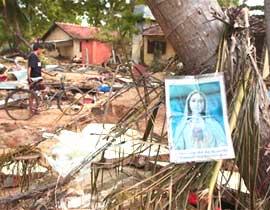Why did the disaster happen? Before us stands a stark intellectual choice, between a natural explanation for the disaster and an explanation of another kind

Humanity in the modern era excels in its ability to recognize and shape the world in which it lives. But an event like the earthquake in Southeast Asia largely exposes the hubris underlying this perception.
We may have been so preoccupied with the potential for world destruction inherent in our civilization that we forgot that the world also has the ability to destroy civilization. The degree of suffering caused by the tsunami in the Indian Ocean proves that the similarity between us and our ancestors in regards to the threat posed by nature is much greater than most people thought.
The most significant human consequence of the disaster in Southeast Asia, as of any major natural disaster, is the challenge it poses to religion.
A few days after the September 11 attack, I met with the columnist for the "Guardian", Hugo Young, who has since passed away. I asked him how his Catholic faith reconciles with such a terrible act. The answer to that is easy, he replied. We are all sinners and this world is the valley of woe. The attack on New York is not the work of God but of sinful humanity. Then he added: "But I admit that it is much more difficult for me to explain earthquakes."
Earthquakes and belief in God's justice are indeed things that are very difficult to reconcile. However, no religion can avoid trying to do this, and an earthquake as massive as the one on December 26 dramatically resets that challenge. After all, only one big question is asked following an event of such destructive power: why did it happen?
We are faced with a stark intellectual choice: either there is a completely natural explanation for the disaster, or there is a different kind of explanation. The natural explanation is clear and consistent. The tsunami occurred because a tectonic fault on the sea floor caused tremors throughout the ocean.
However, what do worldviews that do not attribute absolute authority to scientists have to say about such phenomena? Throughout most of history, humans have tried to explain earthquakes as a sign of God's displeasure. In 1755, while churches were collapsing around them, the priests in Lisbon insisted on rescuing crosses from the ruins to ward off the disaster, which eventually killed more than 50 thousand people in the city.
But some began to think in other directions. Walter asked what kind of God would allow such a thing to happen. Has Lisbon sinned more than London or Paris? Immanuel Kant was so shocked by the disaster that he wrote three separate essays on earthquakes.
Our society seems to be more istanistic. The need for tolerance and pluralism also lead us to respect all religions equally. Indeed, the way the government enacts laws to prevent expressions of religious hatred may block any critical discussion of religion itself.
But it is difficult to think of any event in the modern era that demands an explanation from religions - more so than the recent earthquake. The question that Voltaire addressed to Christians in the 18th century - why Lisbon - must occupy all religions in the world today.
There is no doubt that the huge surges created by the earthquake did not try to separate the victims according to their religion. Of course, this fact does not pose any problem to the scientific belief system, but a belief system based on a conception of divine order needs to provide explanations. Why does the earthquake hurt some places and people and not others?
At least since Aristotle, intelligent people have tried to find an explanation for a world order in which such seemingly arbitrary events can occur. 18th century Europe had the curiosity and independence of thought necessary to ask and answer these questions. But can we say the same about Europe in the 21st century? Or are we afraid today to even ask if the God who is able to do such things can exist?
Martin Ketel Guardian, Haaretz, Walla News!
